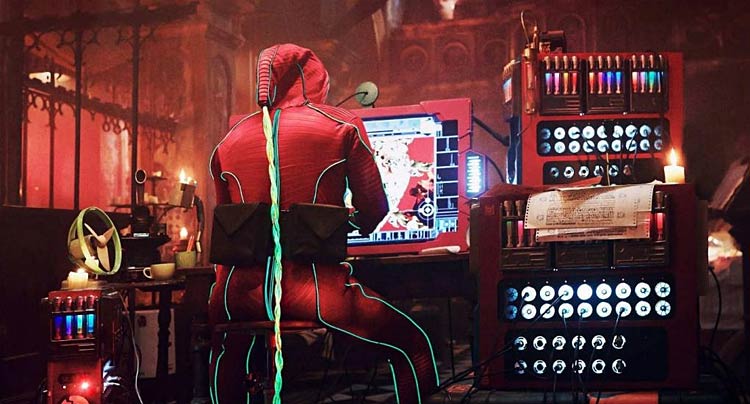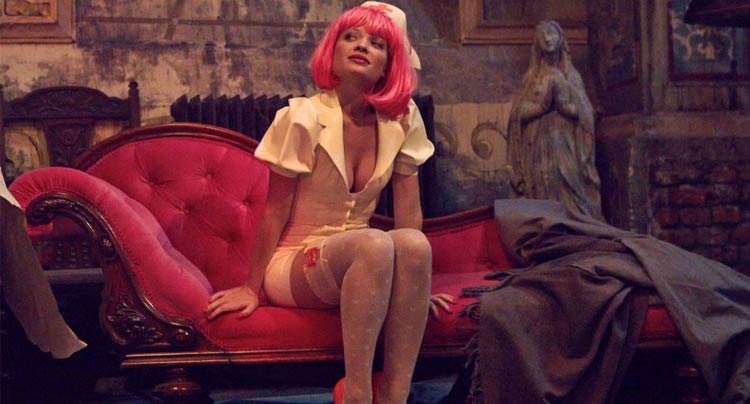
Stumbles not for a lack of ambition, but a misfire of good ideas that are ultimately stretched too thin.

Stumbles not for a lack of ambition, but a misfire of good ideas that are ultimately stretched too thin.
Terry Gilliam is no stranger to absurd dystopian science-fiction films. His best work came early in his career with films like Brazil and Twelve Monkeys, and his latest film The Zero Theorem feels like an extension to those titles. Written by a creative writing teacher from the University of Central Florida (Pat Rushin), The Zero Theorem takes a satirical stab at a dystopian future — mocking big government, commercialization, our fascination with always being connected, and even the meaning of life itself. Unfortunately, the outcome is neither as funny nor fascinating as it should be, though after a decade of disappointment from the filmmaker it’s at least a step in the right direction.
Set in an Orwellian future, an introvert computer hacker Qohen Leth (Christoph Waltz) attempts to convince Management (played by a white-haired Matt Damon) for the opportunity to work from home, claiming he would double his work output. Though efficiency isn’t the real reason Qohen is so adamant about working from home. It’s actually so that he won’t miss an important phone call from a mysterious party (for reasons not explained until later). Management compromises by letting him work from home as long as he spends his time solving the equation for the meaning of life, aka Zero Theorem. Only in a Gilliam film is finding the meaning of life a difficult task and not an impossible one. But Qohen is willing to accept this challenge.

Frequent interruptions prevent the recluse from making any breakthroughs on Zero Theorem. Perhaps none more distracting than the beautiful bombshell Bainsley (Mélanie Thierry), who shows up at his door after meeting him at a party. She is easily attracted to him, for no reason other than to move the plot forward, and her character has as much depth as a blank canvas. Bainsley distracts him from his work so much that Management sends his cocky whiz-kid son Bob (Lucas Hedges) to help keep Qohen focused on the task at hand.
For a film with such high concepts and philosophies, The Zero Theorem has some serious logic flaws. It’s unfitting that Management doesn’t enforce any rules despite showing authority. Especially considering Qohen is constantly under surveillance by cameras in his home and follows orders from Management. But for some reason the computer genius gets the luxury of deciding to keep working on a never-ending math problem or calling it quits for a beautiful woman. Which seems like a no-brainer, even for a dim-witted person like myself. Putting logic aside, the major themes of the film involving how life is both meaningful and meaningless are successfully carried out. Just don’t expect it to make a lot of sense.
Although the writing is uneven, the acting on the other hand is an area in which The Zero Theorem excels. Most of the weight is put on the shoulders of Christoph Waltz and as usual he handles the load with ease. His portrayal of an isolated computer genius on the verge of a mental breakdown is divine. The young Hedges serves as a solid companion to Waltz, bringing a lot of the same eccentric energy to his character that Brad Pitt did in Twelve Monkeys. Both Matt Damon and Tilda Sinwton are barely on-screen enough to call for much discussion, but do well with their limited screen time. Mélanie Thierry was doomed from the start as her character is so poorly written as a glorified “booth babe”, simply eye-candy with little substance.

It’s unfortunate most of The Zero Theorem takes place indoors because when the film ventures outside, a beautiful fantasy world is brought to life. In Gilliam’s vision of the future, smart cars zip down streets lined with people wearing bright neon colors, with large electronic billboards far and wide. All of the energy and flashing colors from the city is completely unlike the dark and claustrophobic dungeon where Qohen spends most of his time. On top of the gorgeous production design, Gilliam employs his signature off-kilter camera angles to emphasis the satire bend and circus-like theatrics.
Unfortunately, The Zero Theorem lands in the middle of the road in terms of Gilliam’s work. The film doesn’t reach the levels that Brazil, Fear and Loathing in Las Vegas, or Twelve Monkeys did, though it easily surpasses his most recent efforts in Tideland and The Brothers Grimm. The Zero Theorem stumbles not for a lack of ambition, but a misfiring of good ideas ultimately stretched too thin. Ironically, The Zero Theorem preaches everything while trying to convince the audience that the film actually amounts to something.